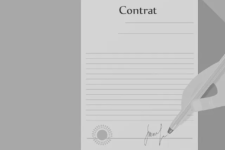
Commercial Court of Paris, 22 May 2020, n ° 2020017022
This is the first court decision that will reassure restaurateurs: the Commercial Court of Paris has sentenced, under an order of 22 May 2020, the insurer AXA FRANCE IARD to take over the loss of operating losses declared by an insured Parisian restaurateur in connection with the Covid-19 pandemic.
Thus, the insurer was ordered to pay a provision of € 45,000 resulting from the closure of the establishment following the health crisis.
In the present case, the restaurateur had an insurance contract with the operating losses component that read: “coverage is extended to administrative closure imposed by the police or health or safety services “.
Following the claim, AXA France IARD refused to cover the operating loss claim on the grounds that it was an “uninsurable” pandemic risk.
Before the tribunal, AXA France IARD argued in particular that :
* The administrative closure within the meaning of the insurance policy was the one that should have been taken by the prefect and not by the minister of Health ;
· The insured restaurateur was, in a way, at the origin of his own prejudice because he could have maintained his activity by organizing the takeaway since, according to the insurer, the order of March 14, 2020 implied only the Prohibition of no longer welcoming public and without imposing the closure of the establishment.
The Paris Commercial Court did not hear these arguments.
According to the magistrates, whether it is the prefect or the minister, under French law, it is an administrative power and, therefore, the administrative decision of closure taken by the minister and not by the prefect also made it possible to mobilize the insurance guarantee “operating losses” within the meaning of the insurance contract. In addition, the insurance contract did not provide for any distinction in this regard.
With regard to the insured’s discretionary decision not to opt for the “takeaway” sale, the court held that :
– the insured restaurant has never practiced the takeaway sale,
– that in any event the fact of not having resorted to it did not remove the Prohibition of no longer receiving from the public, a fundamental element for this type of activity.
The Paris Commercial Court upheld the strict interpretation of the insurance contract.
As a reminder, – even if the present decision of the Commercial Court of Paris makes no mention of it, – the insurance contract is interpreted against the drafter of an act, that is to say against the insurer and in favor of the insured. This is a membership contract par excellence, with a few rare exceptions.
Article 1190 of the Civil code states that in case of doubt, the contract of membership is interpreted against the one who drafted it.
Moreover, if a clause of the insurance contract is not written in a clear, precise and unambiguous way, the insurer must bear the consequences :
* “Any obscure or ambiguous clause must be interpreted against the insurer “(CA Montpellier, June 27, 1990 : RGAT 1990, page 118).
· “( … ) But, first of all, it was by interpretation that the ambiguous terms of the contract made it necessary that the court of Appeal interpreted the contested guarantee exclusion clause (Civ. II, 18 November 2010, n°09-71247).
The in favorem interpretation is naturally the one that allows the insured to be granted the insurance guarantee.
This argument drawn from the interpretation of an insurance contract in favour of the insured and against the insurer drafting the act could be used by the insured in disputes between them and insurers regarding the coverage “operating losses” now potentially mobilizable under the consequences of the Covid-19 pandemic.









